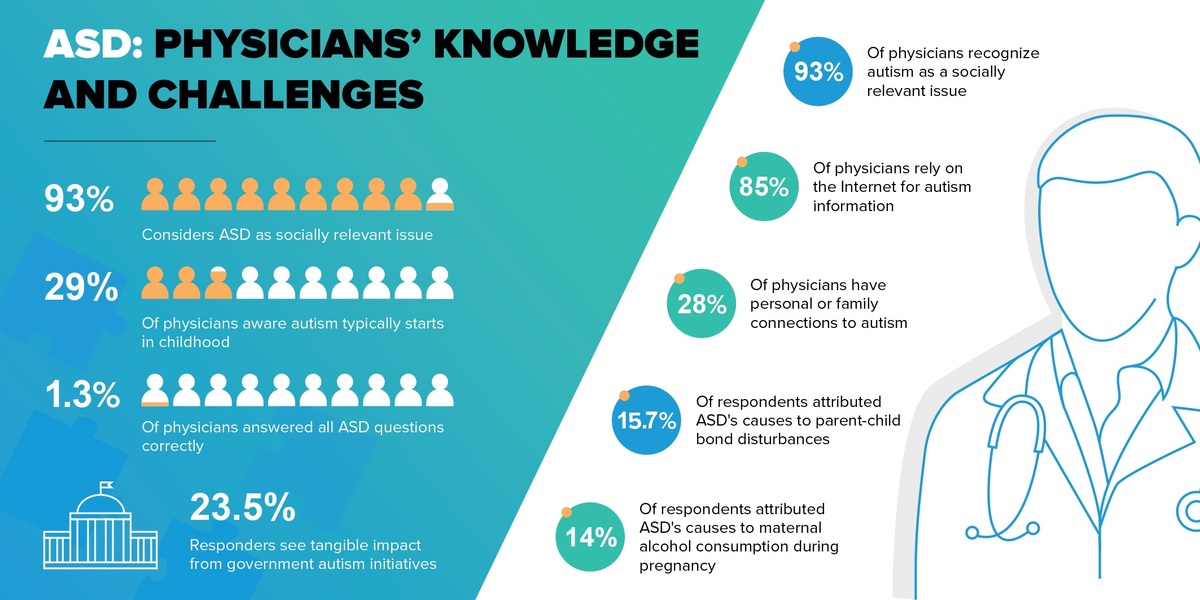Current issue
Archive
Manuscripts accepted
About the Journal
Editorial office
Editorial board
Section Editors
Abstracting and indexing
Subscription
Contact
Ethical standards and procedures
Most read articles
Instructions for authors
Article Processing Charge (APC)
Regulations of paying article processing charge (APC)
MEDICAL EDUCATION / RESEARCH PAPER
Evaluating Physician Knowledge of Autism Spectrum Disorder: Addressing Diagnostic Challenges, Comorbidities, and the Need for Targeted Education
1
The Centre of Postgraduate Medical Education, Poland
2
School of Public Health, Centre of Postgraduate Medical Education of Warsaw, Poland
Submission date: 2025-01-04
Final revision date: 2025-05-14
Acceptance date: 2025-05-15
Online publication date: 2025-06-25
Corresponding author
KEYWORDS
TOPICS
ABSTRACT
Introduction:
Autism Spectrum Disorder (ASD) is a complex neurodevelopmental condition with diverse symptoms and frequent comorbidities, posing diagnostic challenges. Despite advances in ASD awareness and diagnostic methods, significant knowledge gaps persist among healthcare professionals. This study assessed physicians' knowledge of ASD, focusing on symptoms, comorbidities, and diagnostic challenges to enhance patient care.
Material and methods:
This study, conducted in 2024, involved physicians attending courses at the Centre of Postgraduate Medical Education in Warsaw (CMKP). Participation was anonymous and voluntary. Respondents completed the author's questionnaire and the Knowledge about Childhood Autism among Health Workers (KCAHW) questionnaire to assess autism knowledge across four domains: social interaction impairments, communication issues, obsessive behaviors, and disorder onset and comorbidities. Physicians also provided professional and demographic data.
Results:
The study included 395 physicians, primarily young (mean age 31), female (75%), and in early career stages, with most having up to five years of experience. While 75% had some contact with individuals on the autism spectrum, only 28% had close family or acquaintances with ASD. Knowledge about autism was moderate, averaging 74% correct responses, with higher accuracy in recognizing social interaction impairments (80%) and repetitive behaviors (78.5%), but lower accuracy regarding comorbidities (63%). Younger, less experienced physicians, women, and those with personal ASD contact had higher knowledge about autism.
Conclusions:
The study highlights the need for targeted ASD education to address specific knowledge gaps among healthcare professionals, essential for providing informed and compassionate care.
Autism Spectrum Disorder (ASD) is a complex neurodevelopmental condition with diverse symptoms and frequent comorbidities, posing diagnostic challenges. Despite advances in ASD awareness and diagnostic methods, significant knowledge gaps persist among healthcare professionals. This study assessed physicians' knowledge of ASD, focusing on symptoms, comorbidities, and diagnostic challenges to enhance patient care.
Material and methods:
This study, conducted in 2024, involved physicians attending courses at the Centre of Postgraduate Medical Education in Warsaw (CMKP). Participation was anonymous and voluntary. Respondents completed the author's questionnaire and the Knowledge about Childhood Autism among Health Workers (KCAHW) questionnaire to assess autism knowledge across four domains: social interaction impairments, communication issues, obsessive behaviors, and disorder onset and comorbidities. Physicians also provided professional and demographic data.
Results:
The study included 395 physicians, primarily young (mean age 31), female (75%), and in early career stages, with most having up to five years of experience. While 75% had some contact with individuals on the autism spectrum, only 28% had close family or acquaintances with ASD. Knowledge about autism was moderate, averaging 74% correct responses, with higher accuracy in recognizing social interaction impairments (80%) and repetitive behaviors (78.5%), but lower accuracy regarding comorbidities (63%). Younger, less experienced physicians, women, and those with personal ASD contact had higher knowledge about autism.
Conclusions:
The study highlights the need for targeted ASD education to address specific knowledge gaps among healthcare professionals, essential for providing informed and compassionate care.
We process personal data collected when visiting the website. The function of obtaining information about users and their behavior is carried out by voluntarily entered information in forms and saving cookies in end devices. Data, including cookies, are used to provide services, improve the user experience and to analyze the traffic in accordance with the Privacy policy. Data are also collected and processed by Google Analytics tool (more).
You can change cookies settings in your browser. Restricted use of cookies in the browser configuration may affect some functionalities of the website.
You can change cookies settings in your browser. Restricted use of cookies in the browser configuration may affect some functionalities of the website.



